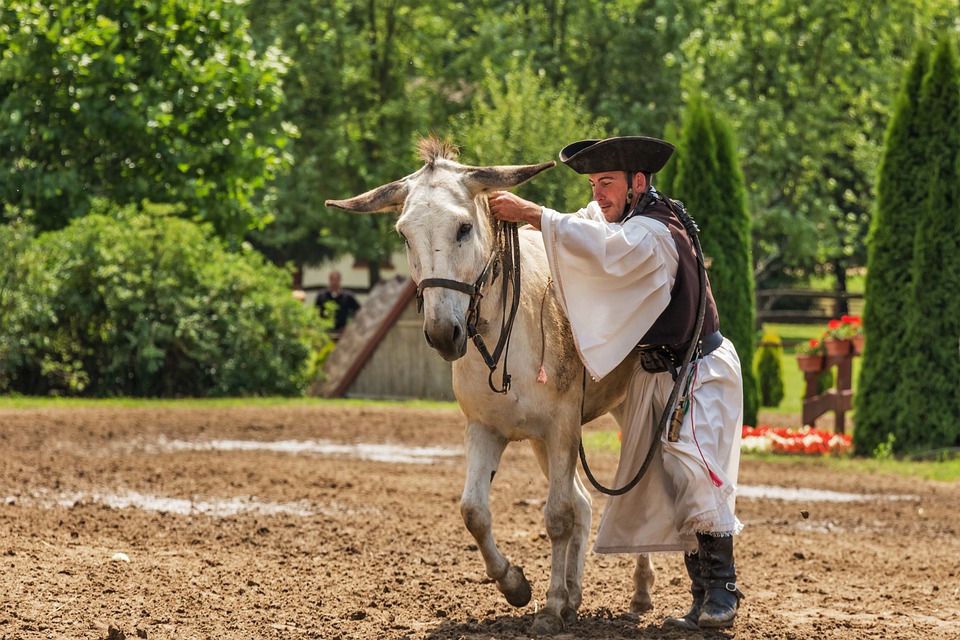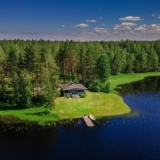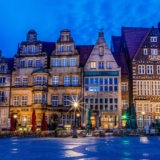A European culture with Asian roots
Hungarian names have interesting origins and they can be quite different from other European names. Why is that? Ancient Hungarian people were nomadic horsemen who came from the surrounding areas of the Ural Mountains in Asia and settled down in Europe in 896. This fact gives a unique touch to the Hungarian language, which is reflected in some of the ancient original Hungarian names, as well:
- Emese, Enikő, Emőke, Ildikó, Piroska, Réka (female given names)
- Attila, Árpád, Béla, Géza, Gyula, Jenő, Levente, Szabolcs, Zoltán, Zsolt (male given names)
As a first impression, we might think that these names are unusual, but the language itself also seems pretty complicated. It turns out, we are not mistaken. With one of the most complicated grammars in the entire world, Hungarian words are hard to write and pronounce. The Hungarian alphabet contains 44 letters with a large variety of interesting vowels, like a, á, e, é, o, ó, u, ú, i and í. Its closest linguistic relative is Finnish, but even after crossing quite a few borders to get there, we might realize there are not so many similarities between the two, although together they are making up the Finno-Ugric group of languages. So, with nothing quite alike in Europe, the Hungarian culture stands out rather as an outcast among its neighbors.
Name structure
Hungarians use the Eastern naming system, which can also be linked to the origins of their culture, resembling the Asian people’s tradition of putting the family name first (vezetéknév) and the given name/names (keresztnév/keresztnevek) last.
Hungarian family names
Most family names stem from the occupations people used to practice. Here are some examples:
- Kovács translates to Smith, Szabó means Tailor, Molnár is the equivalent of Miller, Lakatos means Locksmith, Kocsis is a Carter, Pásztor means Shepherd, Hegedűs is a Fiddler, Pap refers to a priest, Halász represents a Fisherman, Borbély is a Barber, Fazakas is equal in English with Potter and Mészáros is Butcher.
Some people’s names were co-related to their physical characteristics, thus the following names emerged:
- Szőke refers to someone with blonde hair, Fekete means black, probably referring to someone with black hair, while its opposite, Fehér, means white. Kiss means small and Nagy translates to big.
Due to different influences or family liaisons referring to someone’s nationality, some new family names occurred:
- Orosz means Russian, Németh refers to people with German origins, Lengyel means Polish, Török means Turkish, Tóth refers to someone with Slavic origins and Magyar literally means Hungarian.
Particularities about Hungarian family names
Hungarian people often make a conscious effort to keep certain traditions, to pay respect to their ancestors and their values. This can be reflected in traditional dances, costumes, but also names and naming traditions. For example, there are names that keep the ancient spelling of some names, just like “cz” instead of “c” in Incze or the “y” instead of a simple “i” at the end of Vörösmarty. There are certain reoccurring suffixes that are used in family names and they can have different purposes:
- “-fi” means someone’s son, so in the case of the family name Péterfi, it refers to Péter’s son.
- “i” is added to the name of a geographic location, like the Hungarian city Debrecen, so that Debreczeni can be attributed to someone coming from that place.
Other foreign influences
History has a huge influence on the culture, traditions, and nonetheless, the names of a population. It is the case of Hungarian names this was reflected by the variety of names with German and Slavic origins, many of which were “magyarized” in order to be more easily implemented. For example, during the Austro-Hungarian Empire, many Austrian family names were implemented in the Hungarian culture. It is quite common to meet someone from Hungary named Bauer, Kraus or Müller, but also to find names with Slavic origins, like Bagóczky or Boskovics.
Name after marriage
Speaking of traditions, many Hungarian women still take their husband’s name after marriage, but there are also other alternatives when it comes to this.
Let’s imagine a young Hungarian couple ready to get married: Fazakas Hajnalka and Csiszér Tamás.
Hajnalka can make the following decisions:
- She can become Csiszér Hajnalka, taking her husband’s last name.
- She can add the suffix “-né” (meaning wife, woman) to her husband’s given name, becoming Csiszér Tamásné (the wife of Csiszér Tamás). This option is pretty unlikely in our days, but especially during war times, women would often be called by their husband’s name, followed by this specific ending.
- She could use the same name as mentioned before, but add her initial name to the formula, thus resulting in Csiszér Tamásné Fazakas Hajnalka.
- The particle “-né” can also be added to the husband’s last name, followed by her maiden name: Csiszérné Fazakas Hajnalka.
- A more modern alternative would be to keep her name, Fazakas Hajnalka.
For Tamás, there would be the following solutions:
- Keep his own name.
- Take his wife’s name, becoming Fazakas Tamás.
- Combine the two surnames, thus getting the name Fazakas – Csiszér or Csiszér – Fazakas by hyphenation.
Baptismal names
There is an interesting custom followed by many Hungarians who want to keep religious traditions, and that is getting a baptismal name. A baptismal name is a saint’s name chosen freely by the person who gets it during a religious ceremony. This name does not appear in any official documents, it only has a symbolic purpose. Children at around the ages of 8-13, or older, get inspired by religious stories about the lives of saints, thus choosing the one that inspires them the most. For example, many girls choose the baptismal name Rita, inspired by a strong female model of kindness and acceptance, while boys may choose Péter, a symbol of strength and resilience.
Name Day
Hungarians also celebrate their name day. Following this small tradition, people tend to call each other on the night before their name day or even bring flowers or chocolate to their loved ones on this occasion.
Inventing names
When it comes to inventing new names, Hungarians are pretty open to this practice. There is a special committee hired by the government that decides each year if parents can give their children a certain name or not.
For example, in the year 2016 names like Lotta, Nurbanu and Náni (all names of foreign origin) were accepted, but Fenyő (meaning “pine”), Cukorka (“candy”) and Táblácska (“little writing board”) were declined.  In 2017, names like Hannibál, Vulkán (volcano), Őzike (little deer) and Vanília (vanilla) were approved, but Zion, Jennifer and Mercedes were rejected (although Mercedesz, with a more traditional Hungarian spelling, is an accepted female given name).
In 2017, names like Hannibál, Vulkán (volcano), Őzike (little deer) and Vanília (vanilla) were approved, but Zion, Jennifer and Mercedes were rejected (although Mercedesz, with a more traditional Hungarian spelling, is an accepted female given name).
On the other hand, some invented names dating back to the 19th century have become so common that their origin may be a mystery even to Hungarians. There are some very popular Hungarian names that were actually invented by famous writers:
- The famous Hungarian poet, Csokonai Vitéz Mihály, invented the female given name Lilla (meaning Violet).
- Writer Vörösmarty Mihály invented the names Tünde and Csilla, deriving them from the words Tündér (Fairy) and Csillag (Star).
- Arany János invented the female name Gyöngyvér, stemming from the word gyöngy, meaning pearl.
If you are interested in how other countries handle similar situations, you can read more about funny or surprising forbidden names from all around the world in our blog article, which you can find here: Forbidden Names from Around the World.
Famous Hungarian People
- Speaking of famous writers, Hungary’s national poet, Petőfi Sándor’s name is traditionally composed of a family name containing the suffix “-fi” and a given name, Sándor, which is the Hungarian variant of the name Alexander.
- Another famous Hungarian person’s name is well-known to the world because of his invention, the Rubik’s cube and that is Rubik Ernő.
- Among the world’s most famous musicians, Liszt Ferenc’s name hides an interesting fact: his family name, Liszt, literally translates to “flour”.
- A fantastic father-son pair of mathematicians’ names are Bolyai Farkas and Bolyai János. Farkas is a pretty interesting given name, because its meaning is “wolf”, which is usually used as a family name, but in this case, it is a given name.
- An interesting fact is that the famous painter Albrecht Dürer’s father was Hungarian, Dürer meaning Door in German, which in Hungarian could be translated as Ajtós (his father’s original name).
- Szent-Györgyi Albert’s name may sound familiar to people because of his contributions brought to the medical field, he discovered the Vitamin C for which he won the Nobel Prize. His name contains the suffix “-i” tagged along to the toponym Szentgyörgy.
- Some other Hungarian people with interesting names, who have also won Nobel Prizes are Kertész Imre (Kertész means “gardener”), the Nobel prize winner in Literature and Bárány Róbert, (Bárány means “sheep”) for his contributions to physiology and medicine.
Hungarian names are unique, they are a reflection of the transformations and processes the Hungarian culture and language went through. With interesting meanings behind them and deeply grounded in tradition, they are still open to change and innovation.












